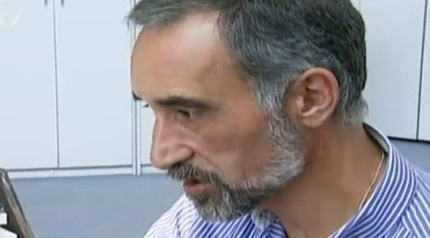Maria S. Topalova
Today, a three-member panel of the Athens Court of Appeal heard the speech for the defence of Bulgarian pilot Janko Stoimenov, who is accused in the case of the plane crash of Cypriot airline Helios. The plane crashed near Athens on August 14, 2005, and all 121 people on board were killed. "Obviously, the judges have no knowledge of the aviation business, they do not understand how pilots are trained and licensed, and it is incomprehensible to them that even the most highly-qualified pilot may make mistakes that can be fatal," said Janko Stoimenov after the meeting.
In order to make flight reality as understandable as possible to judges and prosecutors, the Bulgarian pilot had prepared a special computer visualisation of the cockpit, so that they could understand the nature of pilots' work and the difficulties they are faced with in the event of an accident. Some of the judges showed little interest in his presentation, while others literally demonstrated indifference.
His pleading lasted approximately three hours and was interrupted by many questions both from the court and the prosecutor. They were mostly related to the cause of the crash and whether there had been an opportunity to avert the tragedy. A lot of the questions sounded like hypotheses - what would the pilot do, if this or that happened. Not a single question was heard in the courtroom regarding a specific act of negligence by Janko Stoimenov or a duty of his that he didn't perform.
 "Some 75% of plane crashes in the world are caused by human error. This does not mean that all chief pilots of companies have to lie in prison," reminded the accused. This year, the court of the first instance in Greece gave him a 123 years' prison sentence. The only evidence the prosecution has is the report by the Greek Board for the investigation of the possible causes which led to the tragedy of August 14, 2005.
"Some 75% of plane crashes in the world are caused by human error. This does not mean that all chief pilots of companies have to lie in prison," reminded the accused. This year, the court of the first instance in Greece gave him a 123 years' prison sentence. The only evidence the prosecution has is the report by the Greek Board for the investigation of the possible causes which led to the tragedy of August 14, 2005.
Although perhaps we will never know what happened on the fatal flight's board, a series of fatal errors predetermined its tragic end. Since this type of Boeing has one and the same alarm signals for a problem in the air conditioning and cabin pressurisation failure, the pilots mistakenly decided that it was the air conditioner. At the same time, the pressure in the cabin was gradually changing (abrupt change causes severe pain in the ears and cannot remain unnoticed), the passengers and crew gradually got accustomed to it, starting to feel in a high mood and happy, until they fell asleep...
"I was on leave of absence on the day of the crash. A colleague of mine called me to ask me how long a Boeing 747 can fly with the amount of fuel it had when it had taken off from Larnaca. I told him - between 3 and 3 and a half hours. The aircraft crashed after exactly 3 hours and 20 minutes," recalled Janko Stoimenov.
According to lawyers, the report is extremely insufficient evidence and the trial should be immediately discontinued due to lack of evidence. Their argument is that this is a report of possible causes, which is made to improve flight safety and avoid future similar incidents. This is not a criminal investigation and its conclusions cannot be used as evidence in a criminal trial.
Moreover, from an aviation point of view, there are many inaccuracies and errors. Its conclusions were refuted by a Canadian Commission which conducted a parallel investigation, as well as by some of the world's best experts in aeroplane crashes investigation. "Some of the report's conclusions are not only contrary to logic, but also to the laws of physics," said Janko Stoimenov. According to him, the report took into account the state of 80 indicators of the fatal flight, which reflect about 30% of reality. "For example, we do not know whether there was some smell in the cabin, vibrations or strange noises."
"I have spent thousands of hours wondering what really happened there. 7 years later, I still have no answer to this question, nor do I know how I or my colleagues could have prevented it. Unfortunately, accidents do happen and will continue to happen," admitted the Bulgarian pilot who has thousands of hours of experience as a pilot of Boeing 747s - the same type of aircraft which crashed on August 14.
Lawyers following the process considered as an omission of the Greek justice system the fact that it did not hear the only two witnesses for the prosecutions who knew Stoimenov and who could express an opinion about his work, and of the 30 witnesses for the defence, only three were heard.
This is the second trial against Janko Stoimenov and his colleagues from the former Helios airline. The first was held in Cyprus and it ended with an acquittal decision by the court of the first instance. After the guilty verdict of the Greek court, the Cyprus prosecutor decided to bring prosecutions against them again at the court of the next instance. Lawyers believe that the decision was influenced by the development of the case in Athens. They also did not rule out the possibility that, if an acquittal decision is achieved in Greece, this could lead to a similar scenario for the case in Cyprus as well.
The next hearing of the case will be held on January 15, when the pleading for the prosecution will be heard.
Follow Maria on Twitter @MariaSTopalova